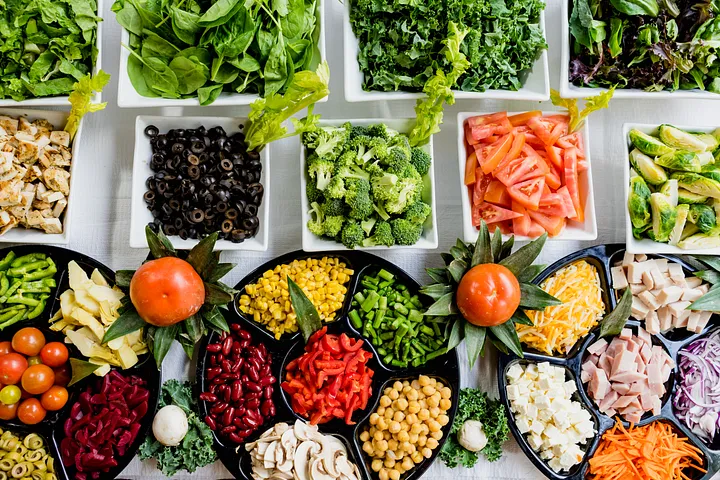Your diet is a bank account. Good food choices are good investments. — Bethenny Frankel
What consists of a healthy diet?
According to the World Health Organization (WHO), a healthy diet must include the following for adults.
- Fruits, legumes, vegetables, nuts, and whole grains
- An adult should eat at least 400g of fruit and vegetables daily, excluding starchy roots (potatoes, sweet potatoes, etc.)
- Less than 50g of free sugars per day is roughly equal to 12 teaspoons (By mistake, I wrote 12 tablespoons in a tweet that will be approximately 170g — I deleted that one immediately).
- Free sugars are already added sugars by manufacturers in beverages, syrups, and by nature in honey, fresh fruit juice, etc. Or, in other words, absolutely no white/brown/cane sugar.
- Less than one teaspoon of salt per day, which is roughly equal to 5g
Now, let’s jump to the learning part of what I consume almost daily. It’s pretty basic food and gives me energy that accommodates my active lifestyle.
Having a varied diet is vital for maintaining a healthy lifestyle. However, given the wealth of currently available knowledge, I wanted to uncover the top 6 most nutritious foods that were also simple to include in one’s diet.
Here are the top 6 foods I eat each day.
1. Eggs
Eggs are a possible way to give your meal additional lasting power and a source of healthy protein.
Evidence suggests that nutrients in eggs may lessen the chance of developing age-related eye problems, which are the most common in adults aged 50 and older.
Approximately 78 cal and 6g of protein may be found in a single egg.
In addition, egg yolks have zeaxanthin, lutein, and antioxidants that are beneficial to maintaining healthy eyes. There is some evidence that lutein can protect your skin from the harmful effects of UV rays.
2. Broccoli & spinach
Broccoli, this leafy superfood, is loaded with vitamins K, C, and A, all of which contribute to healthy bone growth.
Another explanation why broccoli is frequently ranked as the top healthy food is that it contains a good amount of sulforaphane, which is believed to protect against cancer.
Spinach is also a powerful food that helps reduce the risks of high blood sugar, high blood pressure, and even cancer when consumed in moderation. It’s okay for an adult to eat a bowl of spinach daily.
3. Sweet Potatoes
I’m a sweet eater. I love lemon pie and sweet potato pie. — Claude Williams
Every gym person knows the importance of complex carbohydrates, which can only be completed with sweet potatoes.
A single sweet potato, equivalent to roughly a half cup, contains over four times the amount of vitamin A advised daily.
Additionally, it contains some vitamins B5 & B6, vitamin C, vitamin E, manganese, potassium, and many more. These phytonutrients also perform the function of antioxidants, neutralizing the free radicals that might result in illness.
Buy in bulk; they have a good shelf life and consume 0.5–1 daily. I love to bake them.
4. Oats
You have to eat oatmeal, or you’ll dry up. Anybody knows that. — Kay Thompson
Oatmeal is a standard component of the American breakfast and is considered a superfood.
One of the most common deficiencies in our diets is a fiber deficiency, which can be easily remedied by increasing one’s consumption of oats.
Fiber benefits our digestive tracts and waistlines and helps us feel full for longer. These are all highly significant aspects of a breakfast dish.
Oats are one of the top healthiest foods used as the base for various healthy meals.
5. Snow Peas
These snow peas need very little time to prepare, and in addition to being tasty, they may also be enjoyed on their own as a high-protein snack.
The leaves and stems are harvested and served in various dishes when the plant is immature.
The fact that peas were discovered within tombs of pharaohs suggests that the Egyptians held these legumes in holy and high regard.
6. Yogurt
Life is half delicious yogurt, half crap, and your job is to keep the plastic spoon in the yogurt. — Scott Adams
I eat yogurt every day with almost everything. Weirdly, I eat yogurt for breakfast, lunch, and dinner.
I fell in love with eating yogurt when I was a kid; even now, in my early 30s, when I visit my home country, my mother always makes the most delicious homemade yogurt for me. Love!
Yogurt’s probiotic content contributes to the overall health of our digestive systems. Additionally, it has a high calcium content.
The calcium content in only one cup of yogurt is equivalent to about half of the advised daily dose.
Yogurt also delivers potassium, protein, zinc, phosphorus, riboflavin, and vitamin B12. If you want an even more substantial protein boost, eat yogurt, and whenever it’s an option, go for the plain variety.
Thank you for reading; follow me and clap a couple of times. Thanks




